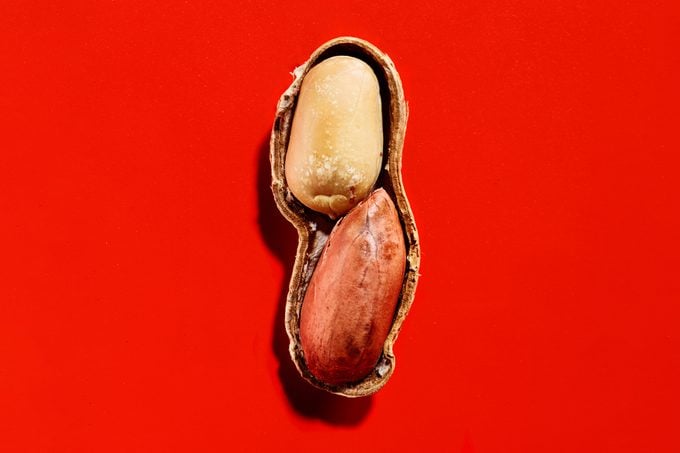Are Peanuts Nuts?
Updated: Nov. 14, 2022

It's time to set the record straight about whether peanuts are actually nuts—and find out why so many people are allergic to them
Did you know that avocados and cucumbers are both technically fruits? As if that isn’t enough to make you question everything you thought you knew about food, peanuts are also up for debate. As it turns out, peanuts might not be nuts at all.
It may sound completely, well, nutty, but peanuts are a bit of a conundrum in terms of what type of food they are technically classified as. And they aren’t the only “nut” causing confusion: Pine nuts and cashews are also head-scratchers. So, are peanuts nuts, and if not, what are they? Let’s set the record straight on this food fact, with the help of a couple insightful experts.
Are peanuts nuts?
Let’s get right down to it. Are peanuts nuts? Technically, no. “Despite what many people think, if someone is defining peanuts by the way they are grown, they are actually legumes and not nuts,” says registered dietitian Sarah Schlichter. Those “nuts” in the hard shell are actually seeds. However, for culinary and research purposes, many people do consider them nuts, according to the Peanut Institute.
Kristi Winkels, a registered dietitian specializing in food allergies and intolerances, explains that the reason peanuts are technically legumes is because they grow underground. Technically, she says, nuts grow on trees.
Are peanuts tree nuts?
Since peanuts grow below the ground, this means that they aren’t tree nuts or even nuts at all. “Tree nuts grow above the ground on trees,” Schlichter says. Nuts that are technically tree nuts include pecans, hazelnuts, almonds, Brazil nuts, walnuts and pistachios.
What’s interesting about peanuts is that even though they are technically legumes, Winkels says that their composition is more similar to tree nuts, like the ones named above. This becomes evident when looking at the nutritional breakdown. However, something that peanuts, other legumes and tree nuts all have in common is that they’re all good sources of plant-based protein.
What is a legume, exactly?
OK, so you know what tree nuts are now. What about legumes? “Legumes are edible seeds that are enclosed in pods,” Schlichter says, adding that beans and peas are two other examples. Besides being a good source of plant-based protein, legumes are especially good for heart health, linked to lowering the risk for heart disease, strokes and type 2 diabetes.
Both experts say that peanuts can definitely provide these health benefits. One study published in 2018 in the Journal of the American College of Cardiology found that people who ate peanuts regularly had a lower risk of heart disease than people who didn’t eat peanuts.
What other nuts aren’t really nuts?
The fact that peanuts aren’t actually nuts can come as a surprise. It makes you wonder what other foods are mislabeled as nuts (and what you might get wrong on this food quiz). Winkels says that cashews are also often incorrectly classified as nuts. “They’re technically a drupe,” she says. Fruits like cherries and peaches are drupes, but Schlichter says that some tree nuts—namely almonds, pistachios and coconuts—also fall under this classification.
So, what is a drupe, exactly? It’s a fruit with a hard, stony layer covering the seed.”Nuts contain both the fruit and the seed of the plant,” Schlichter adds.
Why are so many people allergic to peanuts?

Deciding if peanuts are legumes or nuts may seem like an arbitrary debate, but the classification is very serious in terms of food labeling for safety reasons. According to the U.S. Department of Agriculture, peanuts are one of the most common food allergies in the United States. Tree nuts are also one of the most common food allergies. “Tree nuts have to be identified on food labels in the U.S. for this reason,” Winkels says.
But peanuts aren’t tree nuts. So do foods with peanuts have to be called out on the label? The answer is yes. Any food containing peanuts must say so on the label. If a food product was made in a facility where there could be cross-contamination with nuts or peanuts, Winkels says many companies voluntarily include this on the label, but they are not required to do so.
In terms of why so many people are allergic to peanuts, Winkels says that one theory is that peanuts are eaten in such high quantities in the United States. “We eat a lot of peanuts and peanut butter here, which may be why we have higher reported incidences of peanut allergies than other countries,” she says. Other theories include genetics, soil toxins or less active immune systems.
Winkels says that there is some interesting research showing that early exposure to peanuts could lower the risk of developing an allergy. “This is noteworthy because for so long parents were told to not give their children peanuts until they were around age 6, but now it seems that it may be better to expose infants to them,” she explains, adding that it’s best to talk to your pediatrician about this first.
If you’re allergic to peanuts, what else might you be allergic to?
Unfortunately, the most common way people learn they are allergic to peanuts is by having a bad reaction after eating them. This can include hives or swelling, itching or tingling, throat tightness, shortness of breath, digestive problems or anaphylaxis, which can be a medical emergency. “People can also see an allergist to get specific skin testing as well,” Schlichter says.
Another reason to see an allergist for testing? People with peanut allergies have a higher likelihood of being allergic to tree nuts. According to the American Academy of Allergy Asthma & Immunology, 30% of people with a peanut allergy are also allergic to tree nuts.
Are peanuts healthy to eat?
If you don’t have an allergy or sensitivity to them, both registered dietitians we spoke with fully endorse including peanuts in your diet. “Peanuts are a good source of protein and unsaturated fats,” Winkels says, naming two nutrients that are particularly helpful in keeping blood sugar levels steady.
“Peanuts also offer an array of micronutrients, such as niacin, folate, pantothenic acid, vitamin E, copper, magnesium and manganese,” Schlichter says. “If someone is not allergic, there is no reason to avoid peanuts, as they are very nutrient-dense and easy to add into most dietary patterns.”
Despite their confusing name (although, “pealegumes” doesn’t exactly roll off the tongue), there’s nothing confusing about the health benefits of including peanuts in your diet. As long as you don’t have an allergy, they’re a great plant protein to have on hand. Dietitian approved!
Now that you know all about peanuts, find the answers to other pressing food mysteries, including what’s actually in marshmallows and why milk and cookies go so well together.
Sources:
- Sarah Schlichter, a registered dietitian
- The Peanut Institute: “All About Peanuts”
- Kristi Winkels, a registered dietitian who specializes in food allergies
- Advances in Nutrition: “Legume Consumption and Cardiometabolic Health”
- Journal of the American College of Cardiology: “Nut Consumption and Risk of Cardiovascular Disease”
- USDA: “Food Allergies”
- Canadian Family Physician: “Early exposure to food and food allergy in children”
- American Academy of Allergy Asthma & Immunology: “Everything You Need to Know about Tree Nut Allergy”



